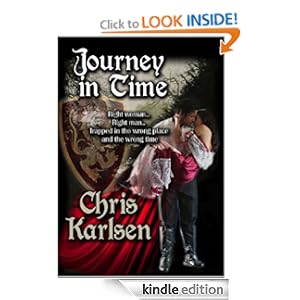DanicaWinters is a best-selling author who is known for writing award-winning booksthat grip readers with their ability to drive emotion through suspense andoften a touch of magic. When she’s not working, she can be found in the wildsof Montana testing her patience while she tries to understand the allure ofvarious crafts (quilting, pottery and painting are not her thing). She alwaysbelieves the cup is neither half-full nor half-empty, but it better be filledwith wine.
Writing with Tension, by Guest Blogger Paranormal Romance author Chris Karlsen
Tension is one of the best means to hold a reader’s attention and keep them from putting your book down. It is also a feeling that isn’t always clearly defined.
If you ask for an example of what adds tension to a story, the first response you often hear is actually an action scene. The problem with that answer is: action isn’t necessarily tension. The car chase through Paris in the movie “Ronin,” is fantastic action. However, the movie’s tension isn’t the high speed pursuit and crash at the end, but comes from the conflict within the group of mercenaries gathered together to obtain a valuable suitcase. Some are trustworthy, others are not. The viewer is on the edge of their seat throughout the movie, wondering if Jean Reno, or Robert De Niro, or Stellan Skarsgard is a traitor.
In any genre there are different ways to inject the story with tension. In a scene from my novel Golden Chariot, Charlotte Dashiell, my heroine, believes that the characters from The Iliad, by Homer, may not have been only fictional. She engages in a heated discussion with Atakan Vadim, the hero. For every point she makes, he presents a challenging counterpoint and thus creates tension. I will paraphrase the dialogue from the scene.
Charlotte: “The story of Troy and the war was retold through the centuries. I’m saying it wasn’t a mere war story. It had to be more.”
Atakan: “No. The bones of the story were given to him (Homer)...a tale which happened to include a few accurate details. Like many bards, he filled it with people from his imagination.”
Charlotte: “Something made the story unique. I say it’s the people.”
Atakan: “He took bits of old tales, injects the legends with heroes and villains for entertainment purposes. Why do you dispute the logical?”
This is a small section of dialogue. Atakan’s disbelief, his doubt and the fact he forces her to defend her beliefs drives the tension between them.
Combining tension with action can be especially fun to write as we as paranormal romance authors can vicariously live experience with our characters. In the following, Charlotte, who’s a nautical archaeologist and part of a shipwreck recovery team, is out swimming in the sea near the team’s campsite. Unbeknownst to her, there’s been an undersea earthquake, which has triggered dangerous tides. What was a relaxing swim becomes deadly dangerous for her.
Like all the team, she was a strong swimmer and tried to power through the swells and turn back. Fighting the tide, she wasn’t making any progress. The current was sweeping her the opposite direction and toward the open water. She kicked harder as the waves surged over her head, pushing against her strokes, the salt irritating her eyes. Every time she opened her mouth to take a gulp of air after the first set, the whitecaps smacked her in the face, sending seawater into her lungs than air.
She caught glimpses of the increasingly distant beach. If she screamed for help no one would hear.
Tension doesn’t always have to be big. We can connect with readers by giving our characters moments of tension that we all experience in our daily lives. Your protagonist absolutely must make a particular flight. But as paranormal romance writers, we are compelled to make things difficult. We torment him in all kinds of ways: He can’t find his car keys. The drawbridge he must cross to get to the airport is up and what seems to be the slowest boat in the world is passing through. He misses the shuttle bus at the long term parking by seconds. The TSA officer chooses the protagonist to pull out of line and perform a thorough and lengthy search of. Haven’t we all had days like this?
As you write, I suggest to look for a way to ramp up the tension in every scene, whether in a small or big way--it will keep your readers wanting to turn the page.
Paranormal Romance Author Chris Karlsen Presents: Where Does Inspiration Come From
Dear Friends,
This week, I have the honor of presenting you with my friend and fellow paranormal romance author with Books To Go Now Publishing, Chris Karlsen. Chris Karlsen is a retired police detective. She spent twenty-five years in law enforcement with two different agencies. The daughter of a history professor and a voracious reader, she grew up with a love of history and books. Check out her paranormal romance books: on Amazon check out the following link: HEROES LIVE FOREVER or JOURNEY IN TIME.
Enjoy!
-Danica Winters
Where Does Inspiration Come From
by Paranormal Romance Author Chris Karlsen
As a [paranormal romance] writer, the most frequently asked question I get is: “Where does your inspiration come from?” My answer is always: “It depends on the story.” Inspiration can hit me like a lightning bolt or it can creep up on me like a ladybug on my arm or it can be an idea that was buried deep within me and has clawed its way to the front of my thoughts.
With my first [paranormal romance] book, “Heroes Live Forever,” the inspiration was an idea buried in my psyche for years. I love a good ghost story and always thought what fun it would be to be a ghost. But then, as I really examined the possibility, I realized how sad it might be too. In the case of my two medieval knights, Basil and Guy, they fought and died for king and country during the 14th century, only to see their homes and family destroyed three-hundred years later because of loyalty to a king. They’ve seen wonderful advances in the world over the centuries, but they’ve also seen everyone they cared about die. I was inspired to explore both the good and bad of their ghostly world because they do still have fun with mortals.
While writing the paranormal romance “Heroes Live Forever,” I found myself liking Guy and enjoyed writing him so much, I was inspired to give him his own book. What to do to him and for him came from my fascination with time-travel and medieval English history. What to do to my characters came to me like the lightning bolt I mentioned.
In “Journey in Time,” Guy has been given another chance at life. Guy, as Alex Lancaster leads a happy, modern world life as a music producer. He finds himself deeply attracted to Shakira Constantine, a successful London attorney. Because he’s her client, it takes a lot of charm for him to get her to agree to spending a weekend in the country with him.
The marriage of time-travel and medieval history gave me the opportunity to torture Alex and Shakira with a world of problems, life threatening problems. Sending them back to the year prior to Guy’s death in battle, I was able to put Alex in the position of facing his death again, if he can’t return to the modern world. His death put Shakira in the position of potentially having to face a very frightening time alone.
“Heroes Live Forever,” and “Journey in Time,” are from my “Knights in Time,” paranormal romance series.
With a book I’ve just finished from a different paranormal romance series, “Golden Chariot,” inspiration crept up on me and over several months.
While walking the ruins of Troy, in Turkey, I thought about the Trojan War. I found myself wondering how it must’ve felt to a citizen of Troy to look out over the Dardanelle Strait and see the masts of hundreds of enemy ships, invaders by the thousands coming to sack and burn your home. From that thought, I wondered what if Homer got it wrong in the Iliad. What if the Trojans didn’t lose the war?
Over the next few months, thoughts of the Iliad’s heroes and villains crept into my head. Another visit to the Troy ruins brought more questions regarding the mythical characters. When it came time to write a paranormal romance story about my curiosity, I gave the heroine my same questions.
I have paranormal romance writer friends who’ve been inspired to write stories around nightmares they’ve had or human interest articles they read in the paper. Some are inspired to write paranormal romance about events they’ve experienced and people they know.
I’d say imagination is a paranormal romance writer’s greatest inspiration. If you can imagine it, you can write about it.





